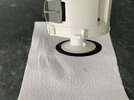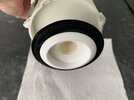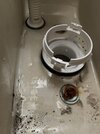How do I adjust the fill level on my cistern?
I need to reduce the amount of water that's coming into the cistern after a flush as it's constantly trickling into the WC pan. See pictures of the insise of the cistern below:




I need to reduce the amount of water that's coming into the cistern after a flush as it's constantly trickling into the WC pan. See pictures of the insise of the cistern below:
Last edited:




